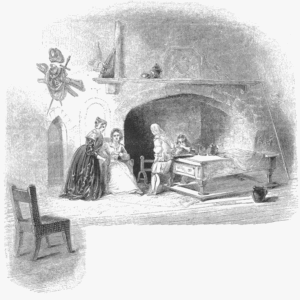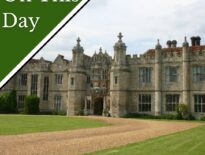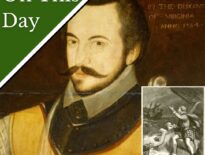
An illustration of the sumner being forced to eat the citation against Joyce Lewis, from Foxe's Book of Martyrs
On this day in Tudor history, 10th September 1557, in the reign of Queen Mary I, Joyce Lewis (Lewes) was burnt at the stake at Lichfield. She was executed for her Protestant beliefs.
Martyrologist John Foxe wrote of how Joyce showed such "cheerfulness" as she was tied to the stake that most of those present "did lament, and even with tears bewail the tyranny of the papists".
Here are some facts about Joyce Lewis:
- Joyce was the daughter of Thomas Curzon of Croxall in Staffordshire and his wife, Anne Aston.
- Joyce's first husband was Sir George Appleby of Appleby in Leicestershire. Joyce had two sons by him before his death at the Battle of Pinkie in 1547. Her second husband was Thomas Lewis of Mancetter, Warwickshire.
- John Foxe explains that Joyce converted to Protestantism after hearing about the burning of Lawrence Saunders in Coventry and then asking questions of John Glover, brother of martyr Robert Glover, who lived nearby.
- Joyce first came to the notice of the authorities when her husband forced her to go to church and she turned her back "when the holy water was cast". She was cited to appear before Ralph Baynes, Bishop of Coventry and Lichfield, and her husband ended up having to go to after he told the sumner who delivered the citation to their home "to take the citation with him again, or else he would make him to eat it". Thomas Lewis submitted to the bishop but Joyce would not, telling the bishop that she had not offended God or any of his laws with her actions. The bishop decided to give Joyce one month's respite and bound her over to her husband for one hundred pounds for her to appear again in a month's time.
- John Glover tried to persuade Lewis against taking Joyce back to the bishop, but Lewis would not listen. He took Joyce back to Baynes, who examined her once more. Joyce was steadfast in her faith so the bishop imprisoned her.
- Following further examinations, Joyce was condemned for heresy. Foxe writes that when the bishop asked her why she would not go to mass and receive the sacrament, Joyce replied, "Because I find not these things in God's word, which you so urge and magnify as things most needful for men's salvation. If these things were in the same word of God commanded, I would with all my heart receive, esteem, and believe them."
- The sheriff could not bring himself to send Joyce to her death, so she spent a further twelve months in prison.
- Before her execution, Foxe writes that Joyce urged her friends to visit her and asked them "how she might behave herself, that her death might be more glorious to the name of God, comfortable to his people, and also most discomfortable unto the enemies of God."
- The day before her execution, Joyce refused the offer of two priests to hear her confession.
- Joyce's friend's Michael Reniger and Augustine Bernher accompanied her to the place of execution and drank with her when Joyce drank, saying "I drink to all them that unfeignedly love the gospel of Jesus Christ, and wish for the abolishment of papistry.".
- Joyce died with courage. John Foxe writes: "When she was tied to the stake with a chain, she showed such a cheerfulness that it passed man's reason, being so well coloured in her face, and being so patient, that the most part of them that had honest hearts did lament, and even with tears bewail the tyranny of the papists. When the fire was set upon her, she neither struggled nor stirred, but only lifted up her hands towards heaven, being dead very speedily: for the under-sheriff at the request of her friends had provided such stuff, by the which she was suddenly despatched out of this miserable world." So, fortunately, her death was hastened by gunpowder.
- In the 19th century, a memorial to Joyce and Robert Glover was established at Mancetter Church.
Also on this day in Tudor history...
Notes and Sources
- Foxe, J. 365. JOYCE LEWES. "The apprehension and death of Mistress Joyce Lewes, the wife of Thomas Lewes, of Mancetter, most constantly suffering for God's word at Lichfield", Foxe's Book of Martyrs, https://www.exclassics.com/foxe/foxe368.htm.
- Summerson, H. (2004, September 23). Lewis [née Curzon], Joyce [Jocosa] [other married name Joyce Appleby, Lady Appleby] (d. 1557), protestant martyr. Oxford Dictionary of National Biography. Retrieved 6 Sep. 2023, from https://www.oxforddnb.com/view/10.1093/ref:odnb/9780198614128.001.0001/odnb-9780198614128-e-16593.



Leave a Reply